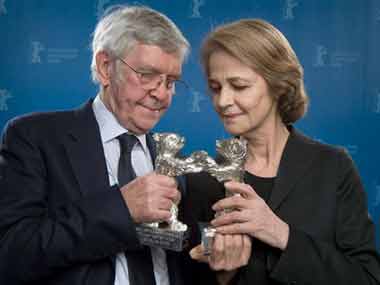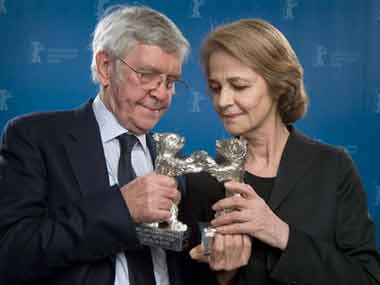There were many riches at the 65th Berlin Film Festival, including Patricio Guzman’s The Pearl Button, Joshua Oppenheimer’s The Look of Silence (and I know I’ll be lynched for this), and Kenneth Branagh’s Cinderella, which I thoroughly enjoyed because it rose feistily above Disney’s insistence that the film’s message be repeated 10 times (I counted). But if top five is what we have to pick, here it is: 45 YEARS A moving, finely nuanced drama by British director Andrew Haigh, who earlier directed Weekend and HBO’s Looking. A week before a middle-aged couple is to celebrate their 45th wedding anniversary, the husband learns that his ex-girlfriend Katya’s body has been found in a glacier of the Swiss Alps, where she fell during their holiday in 1962. Never underestimate the power of the distant past to disturb your future. [caption id=“attachment_2110845” align=“alignleft” width=“380”]  Tom Courtenay, left, and Charlotte Rampling hold their Silver Bears as best actor/actress for their roles in ‘45 years’ during the award ceremony at the 2015 Berlinale Film Festival in Berlin. AP image[/caption] Tom Courtenay and Charlotte Rampling respond to this revelation with magisterial understatement. Rampling is especially powerful as the wife who is tormented by intrigue and jealousy, even as she busies herself with the menu, music and guest list for D-Day. The duo richly deserved the Silver Bears for Best Actor and Best Actress in Berlin. Haigh shows that you can make great cinema with just two good actors and a great screenplay. TAXI Jafar Panahi won the Golden Bear for Best Film in Berlin for Taxi, in absentia. This superb road movie is a defiant act of filmmaking, given the Iranian director has been banned from filmmaking for 20 years and placed under ‘house arrest’. Despite which, this is his third film, after This is Not a Film and Closed Curtain. Panahi himself plays a genial taxi driver and through conversations with his various passengers, we get a sharp portrait of contemporary Iranian issues, as well as the suffocating Islamic rules of filmmaking. His chatty little niece, for instance (Hana Saeidi, Panahi’s real-life niece and the one who collected the Golden Bear on Panahi’s behalf), tells Panahi about the filmmaking rules at her school: women must wear the hijab, you cannot show sordid reality, good guys must not wear ties, good guys must be named after Islamic saints… . Through all these conversations—including with a delightful DVD pirate — we appreciate better the agony of filmmaking and Panahi’s indomitable courage. THE CLUB Chilean director Pablo Larrain’s The Club is a ferocious attack on the Catholic Church. The story is about a group of priests who were exiled for their abuses. The ironies of the “club” are not wasted: membership is hardly to be aspired to; it is a secluded home where disgraced, scandal-ridden priests have been put out to pasture. The filmmaker, who earlier directed Tony Manero and Post Mortem, does not pull his punches. The cast – four men and one woman – perform superbly. The Club makes you realize how appallingly low the Indian threshold for truth is, where a film like The Club would perhaps be impossible to make. Just look at the response to Rajkumar Hirani’s PK, which did not even refer to a particular community or group. The clamorous opposition of assorted babas and their media acolytes to the film, and their nervousness in acknowledging the truth, reveals much more than even the film did. VICTORIA Sebastian Schipper’s Victoria is a high-octane heist thriller about a Spanish woman (Laia Costa) in a Berlin nightclub, who unwittingly finds herself caught in a bank robbery. One of the high points is that the entire film is a remarkable, 134-minute, single shot, weaving in and out of 22 locations. The director of photography, Sturla Brandth Grovlen, won the Silver Bear for Outstanding Artistic Contribution for Victoria and is actually billed ahead of the director in the closing credits. And there is no editor. It is a remarkable achievement, one that gives even the long takes in Birdman a run for their money. AFERIM! Romanian director Radu Jude picked up the Silver Bear for Best Director for Aferim!(Bravo!), which Hollywood Reporter billed as “Romania’s answer to 12 Years a Slave.” The director tackles Romania’s history of gypsy slavery in this magnificent period drama, shot in black and white. Gypsy slavery flourished in Romania for centuries and was abolished only in 1856. Despite its unforgiving subject, the film is partly shot like a Western and leavened with bawdy humour. Jude earlier made The Happiest Girl in the World and Everybody in our Family, which picked up awards at Sundance and Berlin, and were also darkly funny satires set in contemporary Romania. It would be so interesting to see an Indian film on, say, Dalits or other oppressed people, that is deeply felt, stylishly shot and marked with stinging black humour. Any takers? Meenakshi Shedde is South Asia Consultant to the Berlin Film Festival, award-winning critic, curator to festivals worldwide and journalist. Meenakshishedde@gmail.com
There were many riches at the 65th Berlin Film Festival, but if top five is what have to be picked, here it is.
Advertisement
End of Article
Written by Meenakshi Shedde
Meenakshi Shedde is South Asia Consultant to the Berlin and Dubai Film Festivals and independent curator to festivals worldwide see more


)
)
)
)
)
)
)
)
)



